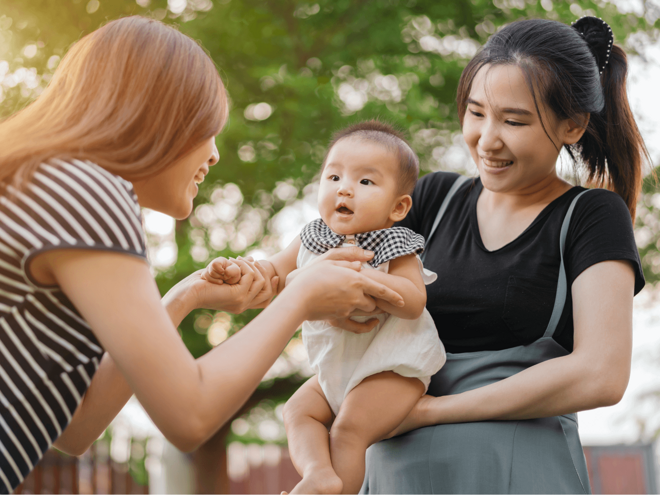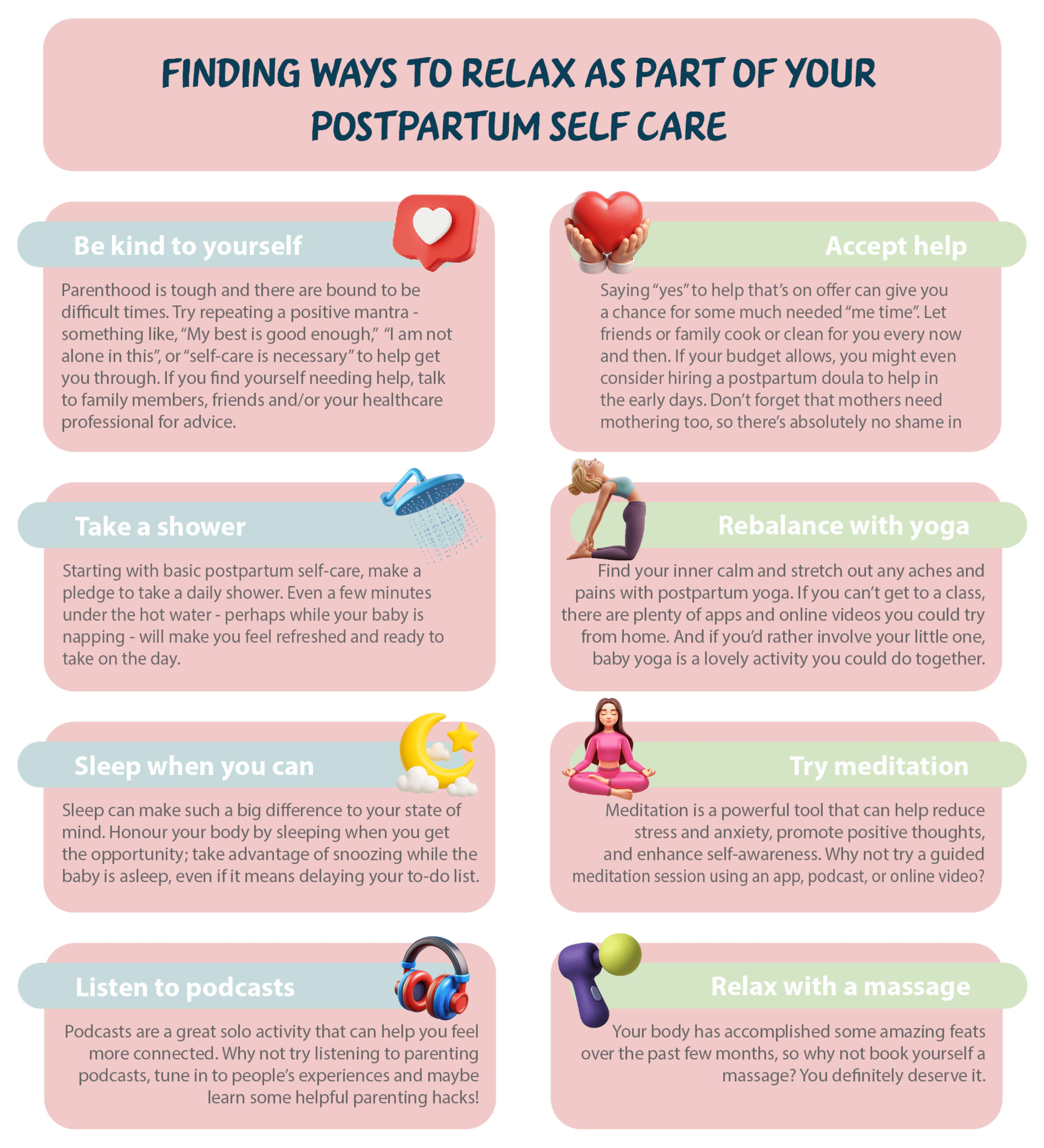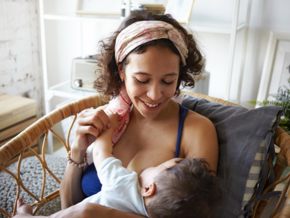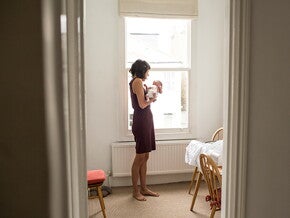
Postpartum Self Care: Staying Connected, Relaxing & Embracing Your Body
Staying connected as part of your post childbirth care
Even with a wealth of online parenting forums and a baby in your arms, it’s easy to feel isolated and lonely as a new mum. Try and stay on top of your postpartum needs, including physical postpartum and mental health care. Get out and about with these parent and baby activities, from play dates to baby yoga, to help you feel more connected.
1. Spend time with family
It’s more than likely that family members—particularly grandparents—will be overjoyed if you turn up and ask them to hold the baby while you eat something/go to the toilet/close your eyes just for a second. When they ask how you are, don’t be afraid to say if you’re having a hard time. Parenthood is full of ups and downs, and it can really help to talk about it with loved ones who’ll always be there for support.
2. Go for a walk
This is one of the easiest things to do with your baby as it’s free, and you can go whenever and wherever you like. Whether it’s to the park or the supermarket, you’ll feel much better by getting some fresh air and having adult conversations with the cashier!
3. Find a mums’ group
There’s a variety of different parent and baby groups—from online parenting groups to face-to-face pram meet-ups and baby support groups—the trick is to find your tribe. And once you’ve found it, why not be the first to introduce yourself to other parents? Forming a group with other parents in the same situation will help you stay connected during this new experience.
4. Suggest a play date or coffee
Think you’ve met a parent that you connect with? Ask them for a coffee or play date. It might just be what you and your fellow friend needs. Chat about the highs and low of parenting, without worrying that you haven’t got dressed or done the dishes today. They might even have some other ideas of things to do with your babies.
5. Try baby yoga
The opportunity to stretch alongside other mums, be it in person or virtually, is bliss. There’ll be no judgment and certainly no headstands in baby yoga. You don’t need to feel guilty for having some “you time” either, as baby will be stimulated and soothed in the same session.
Relax as part of your postpartum self-care
It can be easy to forget to take care of yourself when you’re taking care of a new baby. But you shouldn’t feel guilty for needing some alone time. Try to get into the habit of postpartum self-care. Here are some ways to make time for yourself, from postpartum massage to postpartum yoga.

Building body confidence as part of your postpartum self-care
Having a baby comes with many changes, none less so than the huge transformation your body goes through during and after pregnancy. Your postpartum body is in a transition state between being pregnant and getting back to what you were before pregnancy. Be kind to yourself in this process and be aware that not everything might go back to what it was, and that’s ok. Use the following postpartum body points as a bit of a postpartum checklist to work through.
1. Understanding your postpartum body changes
It’s normal to feel unprepared or overwhelmed by how your body changes while having a baby. Some changes like stretch marks or extra weight, may have started during pregnancy. Other changes like swelling, bruising and tenderness may be due to your labour and/or childbirth experience. If you’re concerned or have questions about your post-baby body, speak to your healthcare professional (HCP) for advice. Sometimes just understanding why something is happening with our bodies can help us accept and adjust to it more easily.
2. Postpartum body recovery in the first 6 weeks
Possible physical changes:
- Sore and bruised from delivery.
- Cramping as your uterus contracts back to its former size.
- Vaginal bleeding known as ‘lochia’.
- Change in size and appearance of breasts
Possible hormonal changes could result in:
- Night sweats
- Mood swings
- Hair loss
Remember, your postpartum body needs time to recover from carrying and giving birth to a baby. Many of these initial changes will feel less drastic and more manageable within around 6 weeks postpartum. Make sure if you have any concerns, speak to your HCP.
3. Your postpartum body 6 weeks to 6 months
Some of the initial physical changes may have eased or gone by now, and some not. Others may just be coming into play. If you’re breastfeeding, you might not see your periods come back for some time. Life as a new parent may lead you to feeling and looking tired, or may lead to body aches from holding your baby for long periods of time. Feeling frustrated or disheartened by some aspects of your post-baby body is common. But remember, it took your body 9 months to form new life, and you’re still adjusting to your new role as a mum. Try to be kinder to yourself and change your expectations around what your body should look and feel like. As always, if you needed further advice please seek help from your HCP.
4. Your postpartum body after baby: 1 year in
By now, you may be looking and feeling more like your old self again, with a few longer lasting or permanent body changes after pregnancy. Your weight may not be exactly the same, or it may be distributed a little differently. If you’re experiencing an ongoing problem relating to pregnancy or childbirth, don’t ignore it. Seeking help from your HCP on postpartum care and getting timely treatment will help you feel better and possibly help avoid future complications.
5. How to be confident in your postpartum body, inside and out
Confidence has a lot to do with mindset. Respecting and accepting the “new you”, physically and emotionally, is a big step towards positive postpartum and mental health. Whatever stage you’re up to postpartum, try not to compare yourself to others. Instead, take care of yourself by eating healthily and making time for the things that make you feel good in your body, whether that’s exercise or reading a book. As much as you can, make your physical health a priority, from attending postnatal care to regular physiotherapy appointments if you need them.
Lastly, your HCP will be able to assist you with any questions or concerns you may have about your body post-baby.
Frequently asked questions about postpartum self care
What clothes to wear after giving birth
After giving birth, wearing clothes that are loose-fitting, have breathable fabrics that allow for easy movement and accommodate your body changes can make a big difference in your comfort. Clothes that are made to accommodate breastfeeding can be particularly handy too, as they provide easy access while keeping you comfortable.
How do I take care of myself after giving birth?
Postpartum self care is crucial, and it can take many forms. Prioritise rest whenever possible, as sleep deprivation is real. Hydration and nutrition also play important roles, so make sure to drink plenty of water and eat balanced nutritious meals. Don’t hesitate to ask for help from family and friends, whether it's for chores or simply having someone to talk to.
Is it normal to cry a lot after having a baby?
It's completely normal to experience heightened emotions and even cry frequently after having a baby. This can be attributed to hormonal changes, physical exhaustion, and even the new responsibility of parenthood. If you find these feelings persist or become overwhelming, it’s important to reach out for support or talk to your healthcare professional.
How long does it take for hormones to balance after birth?
Pregnancy, birth and looking after a newborn really messes with your hormones. While everyone’s body reacts differently, hormones typically take weeks to months for your body to start balancing out after childbirth. Your hormones may fluctuate during this time, which can impact your mood and overall well-being. If you have any concerns about how you’re feeling or coping, seek the support of loved ones or talk to your healthcare professional.
What is the best food for postpartum?
Focusing on nutritious foods from all the different food groups will provide the nutrients you need for recovery after birth. This will be especially important if you are breastfeeding as you will need extra kilojoules each day to support your milk supply. Aim for a breastfeeding diet rich in whole grains, lean proteins, healthy fats, and plenty of fruits and vegetables. Foods like oats, nuts, leafy greens, and fish are excellent choices, as they provide essential nutrients that support healing and energy levels during this transformative time.



